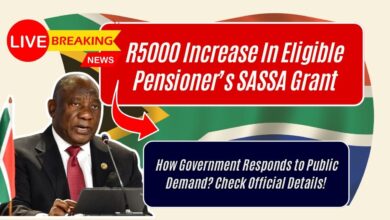New £200 Cost of Living Payment: Check Eligibility Criteria for April–May 2025!
New £200 Cost of Living Payment: As the cost of living continues to challenge households across the UK, the government has stepped up support in 2025 with an extended Household Support Fund (HSF). If you’re wondering whether you’re eligible for the £200 cost of living payment between April and May 2025, this guide breaks down everything you need to know — in plain English. This article offers a complete overview of the £742 million HSF scheme: who qualifies, how to apply, when to expect payment, and how local councils play a crucial role in distribution. Whether you’re a family in financial hardship, a pensioner needing extra support, or a professional advising clients — we’ve got you covered.
The £200 Cost of Living Payment in April–May 2025 is part of a broader Household Support Fund strategy aimed at helping the most vulnerable manage life’s essentials. It’s easy to apply, but you need to act quickly and check your local council’s deadlines and rules. If you’re facing hardship, don’t hesitate—visit your council’s website, prepare your documents, and get the support you’re entitled to. Professionals working with at-risk communities or advising clients should also familiarize themselves with this fund to offer timely guidance.

New £200 Cost of Living Payment
| Feature | Details |
|---|---|
| Amount | £200 one-off payment |
| Scheme | Household Support Fund (HSF) |
| Total Budget (2025–2026) | £742 million |
| Eligibility | Low-income, receiving benefits, or facing hardship |
| Application Start Date | Varies by council (e.g., June 2025 for Birmingham) |
| Where to Apply | Local council websites |
| Proof Needed | Income, ID, financial hardship evidence |
| Extra Support | Food/energy vouchers, grants for pensioners, housing aid |
| Official Info | Gov.uk Household Support Fund Guidance |
What Is the Household Support Fund (HSF)?
The Household Support Fund is a government initiative created to support those struggling with daily essentials such as food, energy, and housing costs. Originally introduced during the pandemic, the scheme has evolved to meet current economic pressures, and it’s now been extended to March 2026 with a new £742 million allocation.
Funds are administered by local councils across England, which have the autonomy to determine eligibility criteria and how funds are distributed. This means support may look slightly different depending on where you live.
Who Is Eligible for the £200 Cost of Living Payment?
Although the exact rules differ from one council to another, most people who meet the following criteria will qualify:
- You are on a low income or receive means-tested benefits such as Universal Credit, Pension Credit, or Income Support
- You are struggling with essential costs like food, electricity, heating, or rent
- You haven’t received HSF support in the past 12 months (specific to some areas like Birmingham)
Example: In Dudley, your household income must be below £40,000, and you should have less than £2,000 in savings.
In Birmingham, applications open in June 2025, and priority is given to those not previously helped by HSF.
Sources:
- The Sun – Birmingham HSF Details
- The Sun – Dudley Council Criteria
When and How to Apply
The application timing and process vary by local authority, but here’s a general guide to help you get started.
Step-by-Step Application Process
Step 1: Visit Your Council’s Website
Each local authority will post guidelines on how to apply and whether applications are currently open.
Step 2: Prepare Your Documents
Gather the following:
- Proof of income (pay slips, benefit letters)
- ID and proof of address
- A short explanation of your financial hardship
Step 3: Submit Online or Via Post
Some councils offer online applications, while others may require paper forms or appointments with advisors.
Step 4: Wait for Approval
Decisions can take a few days to a few weeks, depending on demand.
What Does the £200 Payment Cover?
The £200 is not a loan—it’s a non-repayable grant meant to help with critical household expenses. Examples include:
- Electricity or gas bills
- Groceries and essential food
- Children’s school uniforms
- Basic appliances or winter clothing
Some councils may offer vouchers instead of cash, especially for food or energy bills.
Additional Support Through the HSF
In addition to the £200 payment, the HSF may include:
- Supermarket vouchers (Tesco, Asda, Sainsbury’s)
- Energy vouchers for prepayment meters
- Targeted help for pensioners or families with young children
- Support for rent arrears or council tax debt
Availability depends on your local council’s policies.
Why Is This Important in 2025?
With inflation expected to remain around 3.5% in early 2025 (ONS projections), and energy bills still averaging £1,600–£2,000 per year, the HSF provides a critical safety net.
According to the Joseph Rowntree Foundation, over 13.4 million people in the UK were living in poverty as of 2023 — a number that has only increased amid rising living costs.
£100 DWP Cost of Living Payment Incoming – Is Your Household on the List?
£27 Weekly Payout from DWP Could Ease Household Struggles—Here’s How to Access It
DWP Confirms Bank Surveillance Rollout to Tackle Fraud—Will Your Finances Be Flagged?
FAQs About New £200 Cost of Living Payment
Is the £200 payment taxable?
No. It is a non-taxable, non-repayable grant.
Can I apply if I already receive Universal Credit?
Yes, but eligibility also depends on your household income and financial hardship level.
How will I receive the money?
Via bank transfer, cheque, or voucher, depending on your local council’s process.
Can non-citizens apply?
You must be legally resident in the UK, but eligibility is determined by need, not citizenship.
What if I’m turned down?
You can appeal or reapply in the next funding round. Some councils also work with charities that may offer emergency help.







